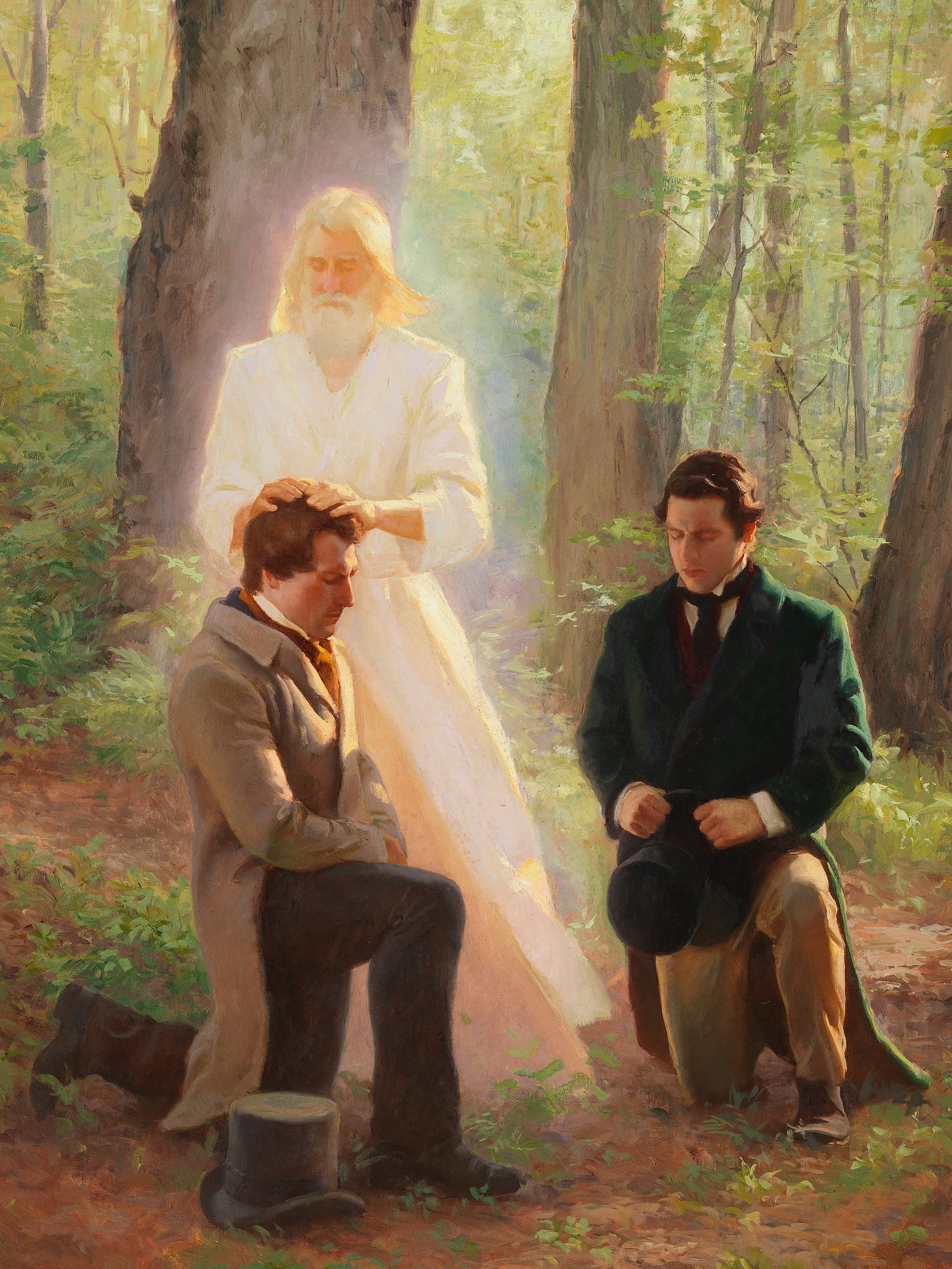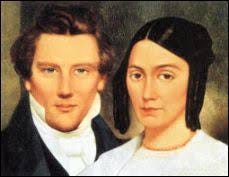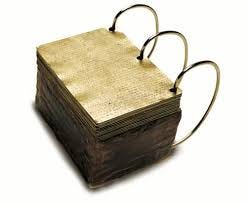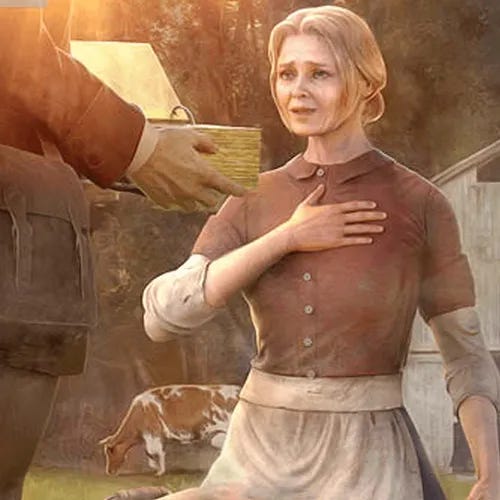Who Can Assist in the Work of the Lord?
Reflections on Doctrine and Covenants 12
The Restoration gains momentum. The Book of Mormon is translated. The Priesthood is restored. New families and friends join with Joseph Smith and Olivery Cowdery to assist in the work of the Lord. Miracles, angelic visitations, and revelations are poured out. The foundations of the True Church of Jesus Christ are planted. Can you imagine being present for all of this?
This week we are studying Doctrine and Covenants 12-17 and Joseph Smith History 1:66-75. In addition to the section headings, the background information for these sections in Revelations in Context ("The Knight and Whitmer Families”), “Voices of the Restoration: The Witnesses of the Book of Mormon,” Saints, Volume 1, Chapter 7, Joseph Smith and the Doctrine and Covenants, The Revelations of the Prophet Joseph Smith, Lucy Mack Smith’s History, and The Revised and Expanded Teachings of the Prophet Joseph Smith, is very helpful for understanding these particular revelations.
Like Oliver Cowdery and Hyrum Smith, others wanted to know how they could help the Prophet Joseph Smith and how they could assist in the work of the Lord. Joseph Knight, Sr. and David Whitmer were two more servants of God who desired a revelation from God concerning their role and their duties in the Kingdom of God.
One thing that strikes me about the revelations that Joseph Smith received on behalf of Joseph Knight, Sr. and David Whitmer is their similarity to previous revelations on behalf of Oliver Cowdery and Hyrum Smith, as well as their similarity to each other. However, there is also very specific counsel given according to the Lord’s wisdom and the purpose for each individual. Through the Prophet Joseph Smith, the Lord was beginning to prepare and gather a Zion people, the Pure in Heart, a people of one heart and of one mind whose individual and collective purpose was to build up the Kingdom of God on the earth and establish Zion.
The Prophet Joseph Smith later gave high praise for and a prophesy concerning Joseph Knight, Sr. I record that praise and prophecy here to help fulfill and establish this prophesy:
For fifteen years he has been faithful and true, and evenhanded and exemplary, and virtuous and kind, never deviating to the right hand or to the left. Behold he is a righteous man, may God Almighty lengthen out the old man’s days; and may his trembling, tortured, and broken body be renewed, and in the vigor of health turn upon him it if be Thy will, consistently, O God; and it shall be said of him, by the sons of Zion, while there is one of them remaining, that this was a faithful man in Israel, therefore his name shall never be forgotten.
Joseph Knight, Sr. was a resident of Colesville, New York in 1829, and he was one of the first to assist the Prophet Joseph Smith during the translation of the Book of Mormon by supplying money, food, and writing materials. As noted in The Revelations of the Prophet Joseph Smith, Joseph Knight, Sr. also paid attorney’s fees for Joseph Smith. Joseph Smith loved Joseph Knight, Sr., and Joseph Knight, Sr. loved Joseph Smith.
One reason why Joseph Knight, Sr. loved and trusted Joseph Smith is because Joseph Smith had worked for him, and Joseph Smith was one of his best workers. Joseph Knight, Sr. trusted and loved Joseph Smith, but he also took time to investigate Joseph Smith’s claims before being baptized:
Because of persecution… I had some thots to go forrod, But I had not red the Book of Morman and I wanted to exeman a little more I Being a Restorationar and had not examined so much as I wanted to. But I should a felt Better if I had gone forward. But I went home and was Baptized in June with my wife and family.
In Revelations in Context we learn more about the relationship between Joseph Smith and Joseph Knight, Sr.:
In the autumn of 1826, a prominent landowner by the name of Joseph Knight Sr. hired 20-year-old Joseph Smith as a laborer. Knight owned four farms, a grain mill, and two carding machines (which prepared wool, cotton, and other materials for spinning). His son Joseph Knight Jr. later wrote, “My father said Joseph [Smith] was the best hand he ever hired,” adding that Joseph told him and his father “that he had seen a vision, that a personage had appeared to him and told him where there was a gold book of ancient date buried, and if he would follow the directions of the Angel he could get it. … My Father and I believed what he told us, I think we were the first after his father’s family.”1
Joseph Knight, Sr. and his friend Josiah Stowell were present at the Smith home in Manchester, New York, on September 22, 1827 when Joseph Smith first obtained the Golden Plates and the Urim and Thummim:
Knight became one of the first to hear about these artifacts when Joseph pulled him aside and told him that the Urim and Thummim was “marvelous” and enabled him to “see any thing.” He also said the plates, which appeared “to be Gold,” were “written in Caracters” and he wanted them translated.2
If someone you knew and trusted informed you that he or she had discovered Gold Plates, Urim and Thummim, and other ancient artifacts, wouldn’t you be curious to learn more? I sure would be curious. Young Joseph Smith, Jr. seemed particularly interested in the marvelous Urim and Thummim that enabled him to see any thing. I too was interested enough in the marvelous Urim and Thummim to read a couple of excellent books on the topic:
Joseph Smith’s Seer Stones, by Michael Hubbard MacKay and Nicholas J. Frederick
Seers and Seer Stones, by Ogden Kraut
From what I understand from these books and other sources, including the scriptures themselves, Joseph Smith’s seer stones and the Urim and Thummim assisted in the process of revelation but later became less necessary as Joseph Smith grew into the principle of revelation. Many of these early revelations, however, were received through the Urim and Thummim.
What did the Lord reveal to Joseph Smith through the Urim and Thummim on behalf of his faithful friend and patron Joseph Knight, Sr.?
The first several verses of the revelation are almost identical to other revelations that Joseph Smith received on behalf of other early assistants in the work of the Lord. The first of the Lord’s repeated declarations is that “a great and marvelous work is about to come forth among the children of men.” Although it is customary or tradition in the Church to view the “great and marvelous work” as the early Restoration and the translation of the Book of Mormon, in my opinion, a more careful study of the scriptures reveals that the Lord’s great and marvelous work has yet to begin or is now in process.
As in the similar revelations to other friends of the Prophet Joseph Smith, the Lord also begins by introducing Himself The Lord makes it clear that it is He, God, that speaks, and not Joseph Smith or any other man. The Lord commands Joseph Knight, Sr. and everyone who reads to give heed unto His word. God’s word is “quick and powerful, sharper than a two-edged sword, to the dividing asunder of both joints and marrow.” Therefore we, along with Joseph Knight, Sr. are commanded to give heed unto His word.
Another repeated declaration of the Lord is found in the next verse. The Lord declares that “the field is white already to harvest.” What is this harvest? It is nothing less than the latter-day harvest of souls, the work and glory of God to bring to pass the immortality and eternal life of man. It is God’s work, and He invites whomever desires to reap to participate in His work. He invites each one of us to participate in His work so that we, like Joseph Knight, Sr. may treasure up for our souls “everlasting salvation in the Kingdom of God.”
Who is invited to participate in the work of the Lord? The Lord invites all who have desires to serve Him to thrust in our sickles and reap. Whomever thrusts in his or her sickle to reap is called of God. Whomever asks shall receive. To whomever will knock, it shall be opened unto him or her. Joseph Knight, Sr. was one of the early investigators into truth who asked and to whom the Lord responded.
What was the Lord’s response to Joseph Knight, Sr.’s request? As in His revelations to Oliver Cowdery, Hyrum Smith, and others, the Lord instructed Joseph Knight, Sr. to keep his commandments and “to seek to bring forth and establish the cause of Zion.”
But the Lord didn’t speak exclusively to Joseph Knight, Sr. He speaks to “all those who have desires to bring forth and establish this work.” In other words, this revelation to Joseph Knight, Sr. applies just as much to us now as it did to him.
What qualifies a person like Joseph Knight, Sr. or you or me to assist in the work of the Lord? Is it position, power, wealth, status, or level of education? No. The Lord revealed to Joseph Knight, Sr. His standards for those who desire to assist in His work:
And no one can assist in this work except he shall be humble and full of love, having faith, hope, and charity, being temperate in all things, whatsoever shall be entrusted to his care. (D&C 12:8)
As we learn in our study this week, this high standard applied just as much to Joseph Smith as to anyone else who was called to assist in the Lord’s work:
One morning, as he was getting ready to translate, Joseph became upset with Emma. Later, when he joined Oliver and David in the upstairs room where they worked, he could not translate a syllable.
He left the room and walked outside to the orchard. He stayed away for about an hour, praying. When he came back, he apologized to Emma and asked for forgiveness. He then went back to translating as usual.24
David Whitmer was the original source for this story:
He [Joseph Smith] was a religious and straight-forward man. He had to be; for he was illiterate and he could do nothing himself. He had to trust in God. He could not translate unless he was humble and possessed the right feelings towards everyone. To illustrate so you can see: One morning when he was getting ready to continue the translation, something went wrong about the house and he was put out about it. Something that Emma, his wife, had done. Oliver and I went up stairs and Joseph came up soon after to continue the translation, but he could not do anything. He could not translate a single syllable. He went down stairs, out into the orchard, and made supplication to the Lord; was gone about an hour—came back to the house, and asked Emma's forgiveness and then came up stairs where we were, and then the translation went on all right. He could do nothing save he was humble and faithful.
Another thing that stands out to me about this moment in LDS Church history is the reality of the plates and the truth of the testimonies of those who saw them or handled them. The Gold Plates and other objects were and are real. The numerous mortal witnesses support the witness of the Holy Ghost that Joseph Smith translated the Book of Mormon from plates of gold that were conferred upon him by the angel Moroni. I will have much more to write on this topic because there were other plates, including the Brass Plates and the Jaredite record, that some of the early saints saw.
Another family that came to the Prophet Joseph Smith’s aid and played an important role in the early Restoration was the Whitmer family. David Whitmer became a friend of Oliver Cowdery and learned from him about Joseph Smith’s discoveries. The rest of the Whitmer family became involved in the work as well, and in fact, David Whitmer traveled to Harmony, Pennsylvania to help move Joseph and Oliver into the Whitmer home in Fayette Township, New York (100 miles north of Harmony).
Joseph and his scribes (which included Martin Harris, Oliver Cowdery, Emma Smith, and John Whitmer) completed the translation of the Book of Mormon in the Whitmer home in June 1829. One of my favorite stories from this time period is Mary Whitmer’s encounter with the angel Moroni:
The Whitmers were a great support during this flurry of crucial activity. Such service brought both trials and rewards to the family. A grandson of Mary Musselman Whitmer (wife of Peter Whitmer Sr.) reported that Mary had “so many extra persons to care for” that she “was often overloaded with work.” One evening, after a long day’s work, she went to the barn to milk the cows and met a stranger who “showed her a bundle of plates” and “turned the leaves of the book of plates over, leaf after leaf,” promising Mary that “she should be blessed” if she were “patient and faithful in bearing her burden a little longer.”9 She thus became another witness of the Book of Mormon.
Mary Whitmer played a vital role in the coming forth of the Book of Mormon because she did the difficult work of caring for Joseph and Emma Smith and Oliver Cowdery in addition to her own family:
In addition to the Three Witnesses and Eight Witnesses, Mary Whitmer, the mother of David Whitmer, was also blessed to be a witness of the gold plates. The angel Moroni showed them to her as an acknowledgment of the sacrifices she made while Joseph, Emma, and Oliver were living in her home. “You have been very faithful and diligent in your labors,” Moroni told her. “It is proper, therefore, that you should receive a witness that your faith may be strengthened.”
This is the same story in greater detail:
Once Joseph, Emma, and Oliver moved to Fayette, David’s mother had her hands full. Mary Whitmer and her husband, Peter, already had eight children between the ages of fifteen and thirty, and the few who did not still live at home resided nearby. Tending to their needs filled Mary’s days with work, and the three houseguests added more labor. Mary had faith in Joseph’s calling and did not complain, but she was getting tired.17
The heat in Fayette that summer was sweltering. As Mary washed clothes and prepared meals, Joseph dictated the translation in an upstairs room. Oliver usually wrote for him, but occasionally Emma or one of the Whitmers took a turn with the pen.18 Sometimes, when Joseph and Oliver tired of the strain of translating, they would walk out to a nearby pond and skip stones across the surface of the water.
Mary had little time to relax herself, and the added work and the strain placed on her were hard to bear.
One day, while she was out by the barn where the cows were milked, she saw a gray-haired man with a knapsack slung across his shoulder. His sudden appearance frightened her, but as he approached, he spoke to her in a kind voice that set her at ease.
“My name is Moroni,” he said. “You have become pretty tired with all the extra work you have to do.” He swung the knapsack off his shoulder, and Mary watched as he started to untie it.19
“You have been very faithful and diligent in your labors,” he continued. “It is proper, therefore, that you should receive a witness that your faith may be strengthened.”20
Moroni opened his knapsack and removed the gold plates. He held them in front of her and turned their pages so she could see the writings on them. After he turned the last page, he urged her to be patient and faithful as she carried the extra burden a little longer. He promised she would be blessed for it.21
The old man vanished a moment later, leaving Mary alone. She still had work to do, but that no longer troubled her.22
This is true.
For her faithfulness, Mary’s sons were also blessed:
Special blessings also came to Mary’s sons. “David, John, and Peter Whitmer Jr became our zealous friends and assistants in the work,” wrote Joseph.10 The same can be said for Christian and Jacob Whitmer, who joined John and Peter Jr. as four of the Eight Witnesses. When David, John, and Peter Jr. asked Joseph to inquire of the Lord concerning their duties, Joseph dictated three revelations now known as Doctrine and Covenants 14, 15, and 16. David, one of the Three Witnesses, was promised that if he asked in faith he would receive the Holy Ghost, “which giveth utterance, that you may stand as a witness of the things of which you shall both hear and see; and also, that you may declare repentance unto this generation.”11
David Whitmer later became one of the three special witnesses of the Book of Mormon, and in Missouri, on July 7, 1834, he was even chosen and ordained as the successor to Joseph Smith and President of the Church. (The Revelations of the Prophet Joseph Smith, p. 25)
We will examine the Lord’s revelations to David, John, and Peter, Jr. Whitmer, the story of the three witnesses and the eight witnesses of the Book of Mormon, the restoration of the Aaronic and Melchizedek Priesthood, and other events in the prelude to the restoration of the Church of Jesus Christ in following posts.










